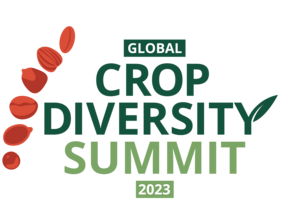Government Representatives:
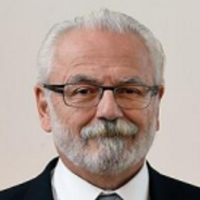
Roberto Jaguaribe
Ambassador
Embassy of the Federative Republic of Brazil in Berlin
Bio
Roberto Jaguaribe was born in Rio de Janeiro on December 27, 1952. He holds a degree in Systems Engineering from the Pontifical Catholic University of Rio de Janeiro, having acceded the diplomatic career through a public entrance exam in 1978. Throughout his career, he has held high-level positions both abroad and in Brazil in the Ministry of Foreign Affairs as well as in other federal agencies of the Brazilian Government.
He served in the Mission of Brazil to the United Nations in New York (1983-87), and at the Embassy of Brazil in
Montevideo (1987-90). He headed the sections of Intellectual Property and Disarmament in the Mission of Brazil to the UN in Geneva (1993-95). He also served as Minister Counselor – Deputy Chief of Mission (DCM) – at the Embassy of Brazil in Washington, DC (2000-03).
At the Ministry of Foreign Affairs in Brasilia, he was head of the division of Intellectual Property and Sensitive Technologies (1992); Director-General of the Department of Commercial Promotion (1998-2000); and Undersecretary of Political Affairs for Africa, the Middle East, Asia and the Pacific (2007-10).
In other areas of the federal government, he has served as Secretary of International Affairs at the Ministry of Planning and Budget (1995-98) and as Secretary of Industrial Technology at the Ministry of Industry, Foreign Trade and Services (2003-05). He also served as President of the National Institute of Industrial Property – INPI (2005-07). He also served as president of the Brazilian Trade and Investment Promotion Agency – Apex-Brasil (2016-2018).
He was Ambassador of Brazil to the United Kingdom of Great Britain and Northern Ireland (2010-15) and to the People's Republic of China and the People's Republic of Mongolia (2015-16).
Since February 2019, he is the Ambassador of Brazil to the Federal Republic of Germany.
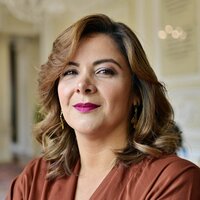
Jhenifer Mojica Flórez
Minister
Ministry of Agriculture and Rural Development of Colombia
Bio
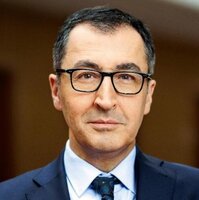
Cem Özdemir
Federal Minister of Food and Agriculture
Federal Republic of Germany
Bio
Cem Özdemir was appointed new Federal Minister of Food and Agriculture by Federal President Frank-Walter Steinmeier in Berlin on 8 December 2021. Özdemir is originally from Bad Urach in Baden-Württemberg. He served as Chair of BÜNDNIS 90/DIE GRÜNEN (the German Green Party) from 2008 until 2018. Between 1994 and 2002 and again since 2013, he has been a member of the German Bundestag. Until 2021, he was also Chair of the Bundestag Committee on Transport and Digital Infrastructure. From 2004 to 2009, he was a member of the European Parliament. In the federal elections of 2021, he became the first Green Party politician in the constituency of Stuttgart to be elected directly.
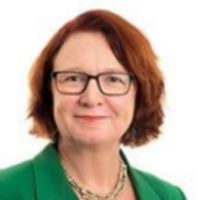
Bjørg Sandkjær
State Secretary
Ministry of Foreign Affairs, Norway
Bio
Ms. Bjørg Sandkjær has been State Secretary (Deputy Minister) for International Development at the Norwegian Ministry of Foreign Affairs since 2021.
Ms. Sandkjær has a broad background in international development, particularly in the fields of global health, human rights and aid effectiveness. She has held positions at the Norwegian Agency for Development Cooperation (Norad), Gavi, the Vaccine Alliance, the UN Economic Commission for Africa, and the Church of Norway.
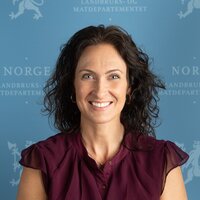
Wenche Westberg
State Secretary
Norwegian Ministry of Agriculture
Bio
Wenche Westberg was appointed new State Secretary in the Norwegian Ministry of Agriculture and Food on 14th October 2021. She is the government’s national convener for food systems. From 2012-2021, she was a political advisor for the Center Party in the Norwegian Parliament.
Keynote Speakers:
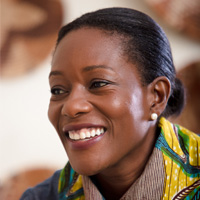
Selassie Atadika
Founder
Midunu Institute
Bio
Selassie Atadika is an award-winning chef, educator, and food systems advocate. She credits her mother and travels to over 40+ countries as a humanitarian aid worker for the United Nations, which influence her cooking philosophy. In 2014, she returned home to Ghana to establish Midunu, Midunu Chocolates, and The Midunu Institute as love letters to Africa - a dedication to celebrate and preserve Africa’s rich culinary heritage. She loves playing at the crossroads where culture, community, and cuisine intersect with environment, sustainability, and economy. This thought process is reflected in her organizations.
Her company Midunu, a nomadic and private dining enterprise in Accra, embodies ‘New African Cuisine’. It celebrates culinary heritage by employing local, seasonal, and underutilized ingredients, including traditional grains and proteins, to deliver Africa’s bounty to the table. Chef Selassie Atadika uses Ghanaian cocoa and chocolate as a base to feature the flavors and essence of Africa. She launched The Midunu Institute, which looks to document and preserve the continent’s culinary heritage. She was a finalist in the 2019 Basque Culinary World Prize, within the top 100 in the Best Chef Awards 2020 - 2021, and 2021 recipient of the La Liste New Destination Champion Award for Africa. Midunu Chocolates has won 3 international honors from the Chocolate Alliance Awards.
Chef Selassie Atadika has been sought for her thought leadership by The New York Times, CNN African Voices, The Financial Times, Al, Jazeera, BBC, and Vogue. Her cuisine has been featured at a State Dinner and the prestigious James Beard Foundation in the US. She holds a Master’s Degree in International Affairs from Columbia University’s School of International and Public Affairs, a Bachelor’s Degree in Geography modified with Environmental Studies from Dartmouth College, and a ProChef 1 Certification from The Culinary Institute of America.

Sophie Healy Thow
Global Youth Campaigns Coordinator
Global Alliance for Improved Nutrition
Bio
Sophie is a young Irish woman who is passionate about creating awareness about food security, particularly amongst young people.
Sophie is the Global Youth Campaigns Coordinator for the GAIN (Global Alliance for Improved Nutrition). She founded Act4Food, a global youth led campaign which aims to transform food systems. This campaign has been mentioned on Forbes magazine and is being implemented globally.
Sophie serves on the Board of the leading international charity ActionAid UK and the Emergency Nutrition Network she was the co-chair of the UN Food Systems Summit Youth Liaison group.
Sophie is one of the 10 women leaders featured in the Disney book ‘Choose to Matter’ by ESPN presenter Julie Foudy which encourages young women to find the leader within and was recognised by TIME magazine as one of the most influential teens. More recently she was named by Food Tank as a Young Person Inspiring Change Across the Food System and spoke at the Nobel Peace Prize and the launch of the EAT Lancet 2.0 at Stockholm +50.
She is an excellent and inspiring communicator with strong leadership skills and a self-motivator with a drive and ambition to succeed.
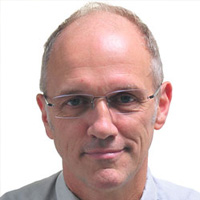
Marco Wopereis
Director General
World Vegetable Center (WorldVeg)
Bio
Marco joined the World Vegetable Center (WorldVeg) as Director General in April 2016. An agronomist with a Doctorate in Tropical Agronomy from Wageningen University, the Netherlands, he has global expertise in agricultural science and management, and previously served as Deputy Director General and Director of Research for Development of the Africa Rice Center (AfricaRice) in Benin, and as Director of the Annual Crops Department of the French Agricultural Research Centre for International Development (CIRAD) in France. He also worked in different capacities for the International Fertilizer Development Center (IFDC) in Togo, the West Africa Rice Development Association (WARDA, now AfricaRice) in Senegal and Côte d’Ivoire and for the International Rice Research Institute in the Philippines. Marco is a Dutch national, and is based at WorldVeg headquarters in Taiwan.
Panelists:
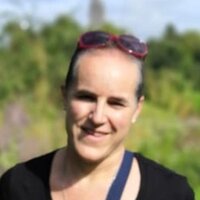
Francisca Acevedo Gasman
Independent Consultant
Former Agrobiodiversity Coordinator at CONABIO, Mexico
Born in Chile in 1967, has been living and working in Mexico for over 25 years.
A United World College alumni (1983-1985), studied Biology at Grinnell College, Iowa USA and graduated in 1989. Obtained her Master´s degree in Plant Genetics from 1991 to 1993 in the Colegio de Postgraduados, Mexico and her PhD in Plant Molecular Biology from the Escuela Técnica Superior de Ingenieros Agrónomos, Universidad Politécnica de Madrid, Spain in 1998.
Worked for 20 years at the “Comisión Nacional para el Conocimiento y Uso de la Biodiversidad”, CONABIO, a federal government agency which was created as Mexico´s bet to the Río Convention in 1992. An institutional gem, serves as a bridge between academia, civil society and government, focused on studying the biodiversity present in Mexico in order to count with the necessary tools to better guide decision making in order to conserve it and use it in a sustainable way.
Her main focus has been both on biosafety and agrobiodiversity in a Center of Origin and Diversity of crops important both for food and agriculture.
She is currently an independent consultant.

Catherine Hazel M. Aguilar
Concept Developer
Leibniz Institute of Plant Genetics and Crop Plant Research (IPK)
Bio
Catherine Hazel M. Aguilar is a Concept Developer at the Leibniz Institute of Plant Genetics and Crop Plant Research (IPK). She is working on the EU-funded PRO-GRACE project, aimed at enhancing the conservation and management of European plant genetic resources (PGR) with an emphasis on developing an advanced PGR-focused Research Infrastructure (RI).
Catherine holds a Master's degree in Plant Genetic Resources Conservation and Management from the University of the Philippines Los Banos and a Bachelor's in Biology from Mindanao State University-General Santos City.
Before joining IPK, she worked for nearly seven years at the University of the Philippines Los Banos. As a genebank curator at the National Plant Genetic Resources Laboratory (NPGRL), she oversaw the Philippine collection of vegetable genetic resources. Catherine worked on various projects centered on managing and utilizing crop genetic diversity, including the characterization and evaluation of vegetable accessions, pre-breeding and varietal development.
Beyond the confines of the genebank, Catherine has delved into resilience assessments of select traditional agroecological systems and the documentation of indigenous crop conservation knowledge systems. In 2022, she assumed leadership of the national genebank (NPGRL) and steered the WP4- BOLD Project in the Philippines. She commenced her professional journey with IPK in May 2023.
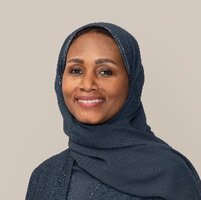
Tarifa Alzaabi
Director General
International Center for Biosaline Agriculture (ICBA)
Bio
Dr. Tarifa A. Alzaabi joined ICBA as Deputy Director General in August 2019. In August 2022, she was appointed as ICBA Director General. She has 20 years of executive and leadership experience in higher education institutions, developing services and strategies through innovation, research, and capacity development.
A social scientist by training, in her current role, Dr. Alzaabi promotes sustainable agricultural development and transformation of food systems through Research and Development, capacity development, women and youth engagement, as well as agripreneurship. She has launched several programs focused on capacity development such as the ICBA’s Youth Engagement Society (ICBA YES) and contributed to the development of the Arab Women Leaders in Agriculture
(AWLA) fellowship program and the training of AWLA fellows.
Prior to joining ICBA, she was Director of Dubai Women’s College, Higher Colleges of Technology. She is also an Edupreneur and a winner of His Highness Sheikh Mohammed Bin Rashid Al Maktoum SME Award as Businesswoman of the Year 2015. Most recently, she won an Emirates Women Award 2020 in the category Best Career Achievements.
Dr. Tarifa A. Alzaabi is a graduate of the UAE Government Leaders Program (Executive Leadership) and is certified as a trainer by the UAE Government Leaders Program to represent the UAE internationally and deliver training to local and foreign governments. She holds a Ph.D. in Education (Management and Educational Leadership) from the British University of Dubai and an Executive MBA in Business Administration with honors from the University of Sharjah and
Executive Education certificate in Climate Change Economics and Governance from The London School of Economics and Political Science.
She is currently serving as Chair of the Steering Committee of the Association of International Research and Development Centers for Agriculture (AIRCA), a global alliance focused on increasing food security by supporting smallholder agriculture within healthy, sustainable, and climate-smart landscapes.
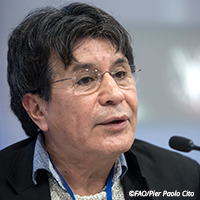
Alejandro Argumedo
Indigenous Quechua leader and current Coordinator
International Network of Mountain Indigenous Peoples (INMIP)
Bio
Alejandro Argumedo is a recognized indigenous Quechua leader and current Coordinator of the International Network of Mountain Indigenous Peoples (INMIP), indigenous food related action, research, and policy re.,He is chief advisor to the Potato Park of Cusco, Peru and “Champion” of the global initiative “Food for Ever”. Alejandro currently works as Director of Programs and Andean Amazon Lead of Swift Foundation. He is member of the Board of Directors of Asociación ANDES, Peru, SeedChange of Ottawa, Canada and Home Planet Funds of the US. He is an agronomist by training and has served on various expert panels for the UN and other relevant bodies and has consulted for national and international organizations.
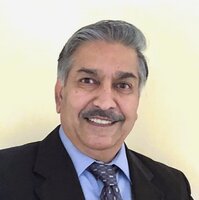
Kailash Bansal
Secretary
National Academy of Agricultural Sciences, India
Bio
KC Bansal, Ph.D. from Indian Agricultural Research Institute (IARI), New Delhi, India and Post-doctorate from Harvard University, USA is currently the Secretary, National Academy of Agricultural Sciences. He served as Professor of Plant Biotechnology, IARI from 2004-2010, and Director of the National Bureau of Plant Genetic Resources from 2010-2016, under the Indian Council of Agricultural Research (ICAR), New Delhi. He was the first to get selected for the prestigious Norman Borlaug Chair for crop improvement by ICAR in India.
He is Member, Board of Directors, Global Plant Council; and Member, Board of Trustees, MS Swaminathan Research Foundation, Chennai. He was elected as Vice-Chair from Asia for the 15th Regular Session of the Commission on Genetic Resources for Food and Agriculture, FAO, United Nations (2013-2015).
As Director, NBPGR, he took an unprecedented initiative to evaluate the entire wheat germplasm (~22000 accessions) conserved in the Indian National Genebank and identified trait-specific reference genotypes for use in breeding high yielding, climate resilient wheats, and was conferred upon the Research Leadership Award for his outstanding contributions in research, coordination and management.
He is recipient of several prestigious awards, and member of several national level science committees. He is elected Fellow of the National Academy of Agricultural Sciences, and the National Academy of Science, India.
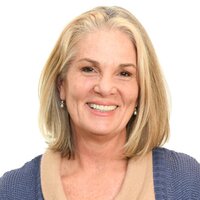
Janny van Beem
Global Genebank Partnership Coordinator
The Global Crop Diversity Trust
Bio
Janny van Beem is the Global Genebank Partnership Coordinator at the Crop Trust, an organization dedicated to conserving and making available plant diversity. She holds a doctorate in Plant Breeding and Genetics from Cornell University. Former expertise includes bean and wheat breeding, genebank quality management and liaison with national commissions for the protection and equitable sharing of plant genetic resources and their traditional knowledge. She is currently involved in conservation activities with national genebanks in 30 countries. The purpose of the activities is to raise genebank standards in support of a global system for the conservation of crop diversity.
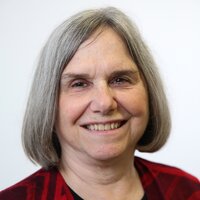
Catherine Bertini
Distinguished Fellow, Chicago Council on Global Affairs
Professor Emeritus, Syracuse University
Executive Board Chair, Crop Trust
Bio
Bertini was awarded the 2003 World Food Prize Laureate for her transformational leadership at the World Food Program, which she led for
10 years. She is a noted advocate for women and girls and was appointed to senior positions by three UN Secretaries-General and five US Presidents. Her impressive career also includes 25 years in the private sector and 13 years on the faculty of the Maxwell School of Citizenship and Public Affairs at Syracuse University, where she is now Professor Emeritus. Bertini also served as chair of the board of the Global Alliance for Improved Nutrition (GAIN) and on the board of the Global Food Banking Network.

Joao Campari
Global Leader, WWF's Food Practice
Action Track 3 Chair, UN Food Systems Summit
Bio
Joao Campari is Global Leader of WWF's Food Practice, leading the organisation’s efforts to enhance the sustainability of the global food system. His primary areas of focus are sustainable agriculture and aquaculture, sustainable diets and food loss and waste. Joao was recently the Chair of the UN Food Systems Summit Action Track 3, on boosting nature-positive production. Prior to WWF, Joao was Special Sustainability Advisor at the Ministry of Agriculture in Brazil, where he also served as President of the Low-Carbon Agriculture Platform and as Executive Secretary of the Agribusiness Commission on Sustainable Development. Joao holds a Ph. D. in environmental economics and his research and publications focus on the nexus of rural poverty and natural resources management in agricultural frontiers.
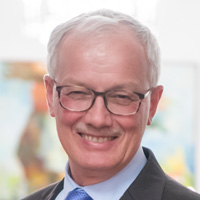
Peter Crane
President
Oak Spring Garden Foundation
Bio
Sir Peter Crane FRS was appointed as the inaugural President of the Oak Spring Garden Foundation in Virginia, USA in 2016. He was at the Field Museum in Chicago from 1982-1999, and Director of The Royal Botanic Gardens, Kew from 1999-2006, before being appointed University Professor at The University of Chicago. In 2009 he was recruited as Dean of the Yale School of Forestry and Environmental Studies (now Yale School of the Environment). He is known internationally for his work on the diversity of plant life – its origin, fossil history, conservation, and use. Peter Crane was knighted in the UK for services to horticulture and conservation in 2004. He served on the Executive Board of the Global Crop Diversity Trust from 2007-2012 and 2014-22. He chaired the Crop Trust Executive Board from 2019-2022. He is a member of several national science academies and the recipient of honorary degrees from universities in the UK and US, including an honorary doctorate from Cambridge University in the UK. He received the International Prize for Biology in 2014.
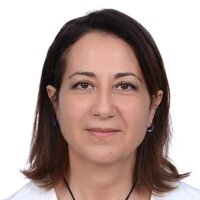
Yasmina El Bahloul
Plant Breeding and Genetic Resources Management Research Director
INRA Maroc
Bio
Yasmina EL BAHLOUL is a senior research Director in plant breeding, graduated from Agronomy and Veterinary Hassan II Institute (Morroco), with a PhD in plant molecular biology from Namur university (Belgium).
Her current job at the National Institute of Agronomy Research focuses on plant genetic resources diversity characterization, breeding and management.
She organized and participated to plant germplasm collection expeditions, nationally and internationally, with multidisciplinary teams, mainly for wild beets relatives and Argan tree (Argania spinosa) collections.
Mrs EL BAHLOUL was awarded with the prestigious Grand Prix Hassan II for Innovation and Research in Agriculture in 2015, for her contribution to the development of new molecular tools.
She was nominated as the National Focal Point of the International Treaty on Plant Genetic Resources for Food and Agriculture (ITPGRFA) in 2017. At the eighth session of the Governing Body of Treaty in november 2019, she was elected to Chair of Africa region representatives and the of Bureau of the Governing Body of the International Treaty 9th session (2019-2021). Mrs El Bahloul was reelected to chair the current session of the 10th Bureau Governing Body of the Treaty as well.
Mrs EL BAHLOUL has also chaired the Svalbard Avisory Vault International Panel in february 2020 and October 2022.
As a scientist and government representative, she participated to and led workshops, side events and plenary sessions, for policy and science and contributed to adoption and reporting decisions, besides being author and contributor to scientific publications, national and international reports.
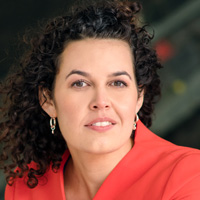
Katie Gallus
Freelance Journalist
Event Moderator
Bio
Geographer, freelance journalist, and presenter with a passion for future-oriented topics and people who are dedicated to the Sustainable Development Goals. In addition to her work as a freelance journalist for outlets such as Deutsche Welle, ZDF, HR, and SWR, she has worked for the United Nations in New York City, conducted research in the Georgian Caucasus, Egypt, Kyrgyzstan, and Brazil; lived in central Cameroon near cocoa fields, worked as a filmmaker in Sierra Leone, and independently traveled to Iraq, Eritrea, and Ethiopia for research purposes. Katie Gallus works in English, German, and French on digital ideas, globalization, development cooperation, and human-environment relationships. She is a trained lifeguard and serves as an honorary ambassador for DESWOS e.V. and the educational initiative German Dream.
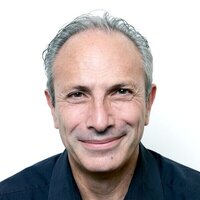
Lawrence Haddad
Executive Director
Global Alliance for Improved Nutrition
Bio
Dr Lawrence Haddad is GAIN’s Executive Director since 2016. In such capacity, he was one of the drivers behind the Initiative on Climate and Nutrition at COP27 in 2022; he chaired Action Track 1 of the 2021 United Nations Food Systems Summit to ensure access to safe and nutritious food for all; and he was the co-founder of the Standing Together for Nutrition consortium, a response to the COVID19 pandemic and the current food crisis.
Prior to GAIN, Lawrence was the founding co-chair and lead author of the Global Nutrition Report from 2014 to 2016. From 2004 to 2014, Lawrence was the Director of the Institute of Development Studies (IDS), the world’s leading development studies institute. Before joining IDS in 2004, he was Director of the Food Consumption and Nutrition Division at the International Food Policy Research Institute (IFPRI) from 1994 to 2004. From 2009 to 2010, he was the UK representative on the Steering Committee of the High Level Panel of Experts (HLPE) of the UN Committee on World Food Security (CSF). From 2010 to 2012, he was the President of the UK and Ireland’s Development Studies Association. An economist, Lawrence completed his PhD in Food Research at Stanford University in 1988.
Lawrence has gained international recognition in two big moments.
In June 2018, the World Food Prize Foundation awarded the 2018 World Food Prize to Lawrence Haddad, and David Nabarro, former Special Adviser to the UN Secretary General. Announcing the award - Ambassador Quinn, World Food Prize President - cited the recipients for their "extraordinary intellectual and policy leadership in bringing maternal and child nutrition to the forefront of the global food security agenda and thereby significantly reducing childhood stunting."
In December 2022, in the first New Year Honours List of King Charles III in the UK, Dr Lawrence Haddad was made a Companion of the Order of St Michael and St George for "Services to International Nutrition, Food and Agriculture". This is an award reserved for overseas and international work that honours individuals who have rendered important services in relation to Commonwealth or foreign nations. The Order's motto is "Token of a better age".
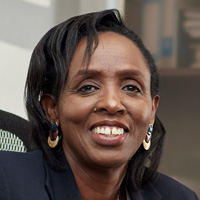
Agnes Kalibata
President
Alliance for a Green Revolution in Africa (AGRA)
Bio
Dr. Kalibata has served as the President of AGRA since 2014, where she leads the organization’s efforts with public and private partners to ensure a food secure and prosperous Africa through inclusive, sustainable agricultural growth, improving the productivity and livelihoods of millions of smallholder farmers in Africa.
From 2019-2021, Dr. Kalibata also served as the Special Envoy of the UN Secretary-General for the 2021 Food Systems Summit, a catalytic process at the start of the Decade of Action to improve food systems around the world to deliver on the Sustainable Development Goals (SDGs) and Paris Agreement.
Prior to joining AGRA, Dr. Kalibata was Rwanda’s Minister of Agriculture and Animal Resources (MINAGRI) from 2008 to 2014, where she drove programs that moved her country from a food insecure to a food secure status and became a reference point for other countries that sought to deliver agriculture transformation.
Dr. Kalibata also sits on various boards, councils and commissions including the Global Commission on Adaptation, the Global Commission on the Economy and Climate, the Global Panel for Agriculture & Food Systems for Nutrition, the Global Agriculture & Food Security Program (GAFSP), the Food Systems Stewardship Board of the World Economic Forum, the Malabo-Montpellier Panel, the Architecture for REDD+ Transactions and the Global Commission on Climate Overshoot, the Advisory Committee of the Presidency of CoP28, among others.
Dr. Kalibata has a distinguished track record as an agricultural scientist, policy maker and thought leader, and she holds a doctorate in Entomology from the University of Massachusetts, Amherst. She is recipient of many prestigious awards including but not limited to the Yara Prize, now the Africa Food Prize, in 2012, an Honorary Doctorate from the University of Liège in 2018, an Honorary Doctorate from McGill University in 2019, and the National Academy of Sciences’ Public Welfare Medal in April, 2019 for her work to drive Africa’s agricultural transformation through modern sciences and effective policy thereby improving livelihoods of smallholder farmers. In 2022, she received an Awarded from World Farmers Organization recognizing her leadership in mobilizing farmers contribution to the Food Systems Summit and the same year also received the Planetary Health Award through the Prince Albert II of Monaco Foundation.
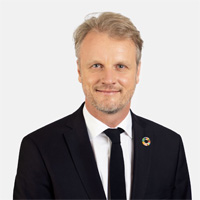
Michael Keller
Secretary General
International Seed Federation
Bio
Michael Keller is Secretary General of the International Seed Federation (June 2014 to present), focusing on the vision of a world where quality seed is accessible to all farmers to support sustainable agriculture and food security. In line with ISF’s mission, Michael is engaged in creating through collaboration an enabling environment for the private seed sector.
Through long-standing involvement at national and international levels, he has an extensive knowledge and understanding of cooperation within the private sector and with non- governmental and civil society organizations. Since June 2022, Michael has chaired the International Agri-Food Network (IAFN), which is the elected focal point of the Private Sector Mechanism (PSM) of the UN Committee on Food Security (UN CFS).
His field of expertise spans a wide range of topics including seed, agriculture, food security, Sustainable Development Goals, law, policy , and advocacy.
Prior to joining ISF, Michael worked in the French Senate as a Parliamentary Advisor, as Head of European and International Affairs of the Mayor’s Association of France, and in different positions at DuPont de Nemours and Pioneer Seed.
Michael studied law in Germany (Law State examination) and holds a post-graduate in law from the Paris-Sorbonne University. He spent time in Switzerland, Tunisia , and France for training in international law and political science.
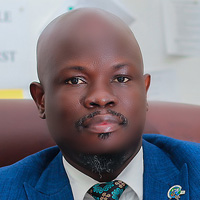
Daniel Ashie Kotey
Acting Deputy Director
CSIR-Plant Genetic Resources Research Institute
Bio
Dr. Daniel Ashie Kotey was born in Tamale in the Northern Region of Ghana. He attended Tamale Secondary School from where he proceeded to the University of Cape Coast to pursue a degree in Biological Science. After his mandatory National Service as a teaching assistant at the University of Cape Coast, he proceeded to the University of Ghana to pursue an M. Phil degree in Insect Science. He also holds a Ph. D Entomology degree from the University of Fort Hare, South Africa.
Dr. Kotey was employed as a Research Scientist at the CSIR-Plant Genetic Resources Research Institute at Bunso in the Eastern Region of Ghana in December 2007 and promoted to the rank of a senior research scientist on 1st January 2018. He was appointed as the acting Deputy Director of the Institute on 1st September, 2019. During his tenure as acting Deputy Director, Dr. Kotey successfully coordinated the external review of the institutional and technical capacity, adequacy of facilities and operational procedures of the CSIR-PGRRI to meet the challenges of long-term conservation and use of its key crop collections. He also led a team to develop a quality management system (QMS) for the Ghana genebank. On 1st July, 2021, Dr. Kotey was appointed as the acting Director of the CSIR-PGRRI.
The research interests of Dr. Kotey include the integrated management of insect pests of various crops and the biosafety of genetically modified crops. Dr. Kotey was a part-time lecturer at the University of Fort Hare, South Africa. He has participated in the implementation of several local and international donor funded projects either as a principal or a co-investigator. Among others, he is a member of the Ghana Science Association and the Entomological Society of Southern Africa. He is also a member of a number of National Committees including the National Codex Committee, the National Variety Release and Registration Committee as well as the National Biodiversity Steering Committee.
Dr. Kotey serves as the National Focal Point for the International Treaty on Plant Genetic Resources for Food and Agriculture (ITPGRFA), the Nagoya Protocol on Access and Benefit-sharing and the Global Strategy for Plant Conservation (GSPC). Currently, he is the Project Manager (Ghana) of the Seeds for Resilience (SfR) Project being funded by the Federal Government of Germany (BMZ), through the German Development Bank (KfW) and managed by the Crop Trust.
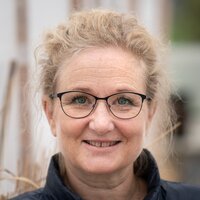
Lise Lykke Steffensen
Executive Director
The Nordic Genetic Resources Center
Bio
Lise Lykke Steffensen is the Executive Director of the Nordic Genetic Resources Center – where she leads the organization and heads the Nordic Genebank. NordGen is the Nordic Council of Ministers and the Nordic countries united plant genebank and research center for genetic resources for food and agriculture. Lise Lykke Steffensen has a long professional career within agriculture and life sciences in both public organizations and private industries. Lise Lykke Steffensen has for decades managed research and innovation, global business areas and worked with business developments on an executive level. She has more than 25 years of experiences within resilient agrifood systems and genetic resources on both national, regional and international level. She has been involved with the Svalbard Global Seed Vault right from the beginning of the first planning. NordGen is one of the three partners to the Seed Vault with its role as responsible for the operational management of the Svalbard Global Seed Vault. Lise Lykke Steffensen also serves as the secretary to the International Advisory Panel for the Svalbard Global Seed Vault. She sits on various boards, panels and think tanks relating to agricultural research and genetic resources as well as she has received several prizes for her work as executive manager, communicator, and professional skills. Lately, in May 2023 she was appointed by ECPGR to be the first chairperson of the European Genebank Manager Network.
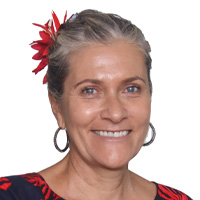
Karen Mapusua
Director, Land Resources Division (LRD)
Pacific Community, Suva, Fiji
Bio
Karen Mapusua is the Director of the Land Resources Division(LRD) of the Pacific Community, Suva, Fiji and is the first woman to hold this position. LRD provides technical and scientific support the Pacific countries & territories on all aspects of agriculture and forestry from genetic resources to markets. Karen leads SPC’s flagship integrated programme to strengthen Pacific food systems for improved health, nutrition and resilience outcomes and has been active promoting the economic empowerment of women through agricultural value chains.
Karen has experience in NGO capacity building and management and has worked in rural development in the Pacific Region for 25 years with a focus on organic agriculture as a path to social and economic development and climate resilience. Through this work she now also represents the Pacific globally as President of IFOAM Organics International
Previously she served on the Board of Directors of Fairtrade Australia New Zealand. She is a national of Samoa and Australia.
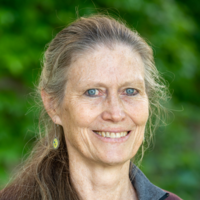
Susan McCouch
Professor of Plant Breeding and Genetics
Cornell University
Bio
Susan McCouch is the Barbara McClintock Professor of Plant Breeding and Genetics in the School of Integrative Plant Science at Cornell University. She received her PhD from Cornell in 1990 and spent 5 years with the International Rice Research Institute (IRRI) in the Philippines before joining the Cornell faculty in 1995. She is known for developing the first molecular genetic map of rice and for her key and sustained role in turning rice into a model for genetics and breeding research. She served as Chair of the Board of Directors of DivSeek International Network from 2015 – 2021, as Director of the Cornell Institute for Digital Agriculture from 2018- 2022 and as inaugural Director of the NSF-Science and Technology Center for Programmable Plant Systems (CROPPS) from 2021-2022. She has received numerous honors and awards, including the Crop Science Society of America Presidential Award, the Chancellor’s Award for Excellence in Scholarship and Creative Activities, Outstanding Faculty Award, the Golden Sickle Award for contributions to international rice research, and an Honorary PhD Degree from Tamil Nadu Agricultural University in southern India. She is a fellow of the American Association for the Advancement of Science, and a member of the National Academy of Sciences.
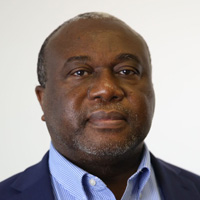
Kent Nnadozie
Secretary
International Treaty on Plant Genetic Resources for Food and Agriculture
Bio
Mr. Nnadozie is the Secretary of the International Treaty on Plant Genetic Resources for Food and Agriculture. Prior to his appointment as Secretary, he was the Senior Officer of the International Treaty, overseeing varioustechnical areas of the Programme of Work of the Secretariat. Over the last decade, Mr. Nnadozie has worked on legal and policy matters and intergovernmental processes, with both the International Treaty and FAO’s Commission for Genetic Resources for Food and Agriculture. Before joining FAO, Mr. Nnadozie was in private legal practice and academic research. He has extensive practical experience in related international processes and legal instruments. A lawyer by training, Mr. Nnadozie holds a Doctorate in Law (PhD) from McGill University, Montreal, Canada, with a focus on international relations and international legal systemic issues regarding genetic resources. Mr. Nnadozie also has a Master’s degree in Business Administration (MBA) and a Bachelor’s in Law.
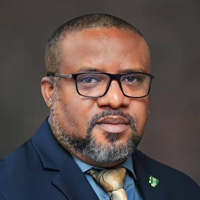
Anthony Ugochukwu Okere
Acting Director
National Centre for Genetic Resources and Biotechnology (NACGRAB)
Bio
Anthony Ugochukwu Okere (PhD) is the Acting Director of the National Centre for Genetic Resources and Biotechnology (NACGRAB), and Acting Registrar of the National Varietal Release Committee in Nigeria since November, 2022.
Previously, he was the Deputy Director for Research and Development, and was also a former head of the Biotechnology department at NACGRAB. During his tenure as the Deputy Director, Dr. Okere successfully coordinated research activities at NACGRAB to meet national challenges and demands. He has contributed in the implementation of several local and international donor funded projects either as a principal or a co-investigator among others.
He received scholarship of the NUFFIC short course Fellowship in The Netherlands in 2007, World Bank STEP-B, Study grant in Florida Atlantic University, USA in 2012, KAFACI Training Fellowship in INRA Morocco in 2016, Crop Trust GOAL workshop in Morocco, 2023 etc. After studying in the University of Ibadan for his Bachelor’s degree Forest Resources Management, he graduated with Master’s degree in Forest Biology and Silviculture from the same University in 1999 and received a PhD in Silviculture and forest biotechnology from the same University of Ibadan in 2015.
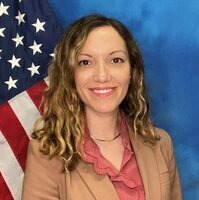
Simone Passarelli
AAAS Science and Technology Policy Fellow
Office of Global Food Security, U.S. Department of State
Bio
Dr. Simone Passarelli is a public health nutritionist who has researched the connections between agriculture, food security, and nutrition for over a decade. She is currently a AAAS Science and Technology Policy Fellow in the Office of Global Food Security at the U.S. Department of State, where she serves as a Policy Advisor to the Special Envoy for Global Food Security.
Prior to the State Department, Dr. Passarelli spent six years in the Nutrition Department at the Harvard T.H Chan School of Public Health as an NIH-funded Postdoctoral Research Fellow and as a PhD student. Her research centered on global nutrition and nutrition-sensitive agriculture, with a particular focus on child growth and animal source foods in sub-Saharan Africa. She also holds an M.S. in Food Policy and Applied Nutrition from the Tufts University Friedman School of Nutrition, and a B.S. in International Agriculture and Rural Development from Cornell University.
Dr. Passarelli previously worked a researcher at the International Food Policy Research Institute and has held positions with PATH, CARE, Action Against Hunger (ACF), and the World Food Programme. She has conducted research in Ethiopia, India, Argentina, Ghana, Tanzania, and Nepal.
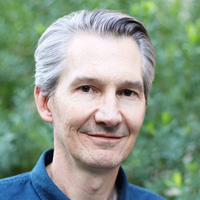
Juan Lucas Restrepo
Global Director, Partnerships and Advocacy, CGIAR
Director General, Alliance of Bioversity International and CIAT
Bio
Juan Lucas Restrepo is Global Director of Partnerships and Advocacy, CGIAR, and Director General of the Alliance of Bioversity International and the International Center for Tropical Agriculture (CIAT). A Colombian and French national, he has worked in the agricultural domain, both in the public and private sectors, for the past 25 years. Previously, he was Vice Minister of the Ministry of Agriculture and Rural Development in Colombia, and Executive Director of AGROSAVIA, the largest agricultural research organization in the country.
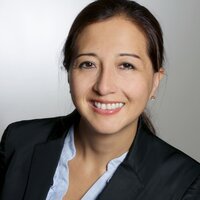
Vanesa Rodriguez Osuna
Net Zero Sector Track Lead, UN Environment Programme Finance Initiative (UNEP FI) UNEP FI
Coordinating Lead Author, IPBES
Bio
Vanesa is Net Zero Sector Track Lead at the UN Environment Programme Finance Initiative (UNEP FI), where she provides technical support and actively engages with financial institutions working in the agriculture, food and real estate sectors. This work is part of UN- convened climate and nature-related initiatives for positive impact finance. Since joining UNEP FI in 2021, she has also led the development of a target setting framework for sustainable food finance, supporting its implementation by a group of financial institutions and agribusinesses.
She is also a senior technical adviser at the Deutsche Gesellschaft für Internationale Zusammenarbeit (GIZ) supporting partners in India, Jordan, Ukraine, Thailand, Malaysia and Germany (mostly governmental institutions) in the areas of green technologies, sustainable supply chains and policy instruments for environmental protection.
Prior to these positions, Vanesa has worked as project director at SEQUA gGmbH, partner of the German business community, designing and implementing projects with private sector partners in the areas of vocational training and labour integration, sustainable consumption and production and green economy.
he has also worked as senior scientist and project manager at the Advanced Science Research Center in New York, leading the development of a science-based framework for measuring social and ecological impacts of global equities affecting water, food and health systems in cooperation with the Harvard Chan School of Public Health. This work resulted in the successful development and testing of this framework on over US$2 billion assets held by a large Dutch pension fund manager.
Vanesa is lead author of various thematic, regional and global assessment reports of the Intergovernmental Platform on Biodiversity and Ecosystem Services (IPBES), the global science-policy platform tasked with the evaluation of the state of biodiversity and of the ecosystem services it provides to society, in response to requests from decision makers. She currently serves as Coordinating Lead Author of the IPBES “business and biodiversity” assessment.
Vanesa holds an Environmental Engineering degree, a M.Sc. in Natural Resource Management and Technologies in the Tropics and Subtropics and a PhD in Natural Sciences (Germany)
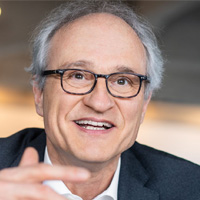
Stefan Schmitz
Executive Director
The Global Crop Diversity Trust
Bio
Stefan Schmitz joined the Crop Trust as Executive Director in January 2020.
He previously worked as Deputy Director-General and Commissioner for the “One World – No Hunger” Initiative at the German Federal Ministry for Economic Cooperation and Development (BMZ). He also chaired the Steering Committee of the Global Agriculture and Food Security Program (GAFSP).
For more than 10 years, Stefan was leading the food security, agriculture and rural development work at BMZ. From 2007 until 2009 he worked as senior advisor to the Secretariat of the Organization for Economic Cooperation and Development (OECD) in Paris. Before joining the BMZ in 2001, Stefan held various posts in the German federal administration in the fields of geographical information systems, regional planning and international cooperation on urban issues.
He received scholarships of the McCloy Fellowship of the American Council on Germany and of the German Academic Exchange Service. After studying in Bonn and St. Andrews, he graduated from Bonn University in geography and mathematics and received a PhD in geosciences from the Free University of Berlin in 2000.

Jaspreet Stamm
Innovative Finance and Sustainability Lead
Crop Trust
Bio
Jaspreet Stamm is the Innovative Finance and Sustainability Lead at the Crop Trust. She is focused on broadening the Crop Trust’s range of financial partnerships and instruments to support its fundraising goals.
Jaspreet has over 18 years of experience working in impact investment and development finance, including supporting biodiversity conservation and sustainable agriculture in Latin America and sub-Saharan Africa. She started her career in private sector operations at the Inter-American Development Bank, with a focus on financial institutions and green credit lines.
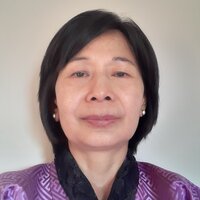
Dr. Asta M. Tamang
Principal Biodiversity Officer
National Biodiversity Centre (NBC) under the Ministry of Agriculture and Livestock, Royal Government of Bhutan
Bio
Dr. Asta M. Tamang is the Principal Biodiversity Officer working at the National Biodiversity Centre (NBC) under the Ministry of Agriculture and Livestock, Royal Government of Bhutan. She is heading the Plant Genetic Resources Division under the National Biodiversity Centre. She worked from the scratch to establish the National Biodiversity Centre with different Programs like Plant Genetic Resources Program, Animal Genetic Resources Program, National Herbarium Program, Royal Botanical Garden Program, Bioprospecting and ABS Program and Biodiversity Information Management Program. Her works include assessment of on-farm crop diversity, on-farm conservation, ex-situ conservation in the genebank, phenotypic characterization, bioclimatic characterization, genotypic characterization, crop-community-culture association, Community Seed Bank, seed security and seed system, climate resilience, formulation of ABS policy, formulation of Biodiversity Act, Animal Genetic Resources conservation, education and awareness on importance of biodiversity etc.
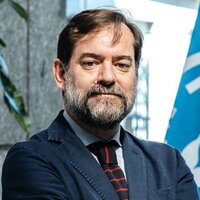
Álvaro Toledo
Senior Technical Officer
International Treaty on Plant Genetic Resources for Food and Agriculture
Bio
An agricultural engineer by training, Álvaro holds a Master’s degree in crop sciences and another on plant genetics. At the Treaty Secretariat, he provides technical leadership in the negotiations to enhance the functioning of the Treaty multilateral mechanisms: the Multilateral System of Access and Benefit-sharing, the Funding Strategy and the Benefit-sharing Fund. He supports the Secretary in policy, governance and programme coherence, and in spearheading collaboration and partnerships with relevant international institutions, such as the Convention on Biological Diversity or the Global Crop Diversity Trust. He joined FAO in 2002.

Éliane Ubalijoro
Chief Executive Officer, CIFOR-ICRAF
Director General, World Agroforestry
Bio
Éliane Ubalijoro, PhD is Chief Executive Officer of the Center for International Forestry Research and World Agroforestry (CIFOR-ICRAF) and Director General of ICRAF. An accomplished leader with a background in agriculture and molecular genetics, she serves on several boards and has been recognized for outstanding contributions in the areas of innovation, gender equity, and sustainable prosperity creation.
Dr Ubalijoro has been a professor of practice for public-private sector partnerships at McGill University since 2008, with research interests focusing on innovation, gender and sustainable development for prosperity creation. From 2021 to March 2023, she was the Executive Director of Sustainability in the Digital Age and the Canada Hub Director for Future Earth. She is a member of Rwanda’s National Science and Technology Council and Presidential Advisory Council, the Impact Advisory Board of the Global Alliance for a Sustainable Planet, the International Science Council, the Science for Africa Foundation, and the Capitals Coalition Supervisory Board, among others. She is a fellow of the International Science Council.

Neil Watkins
Deputy Director
Global Policy and Advocacy division, Bill & Melinda Gates Foundation
Bio
Neil Watkins is Deputy Director in the Global Policy and Advocacy division of the Bill & Melinda Gates Foundation. He leads the foundation’s policy, advocacy, and communications work on agricultural development, nutrition, climate change, development finance and global education. He manages a team of program officers who lead the foundation's advocacy work on these issues and oversees a global portfolio of policy, advocacy, and communications grants.
Neil currently represents the Gates Foundation on a number of external boards and steering committees including Stronger Foundations for Nutrition, the Global Agriculture and Food Security Program (GAFSP) as well as on the Executive Committee of the Scaling Up Nutrition movement. He served as co chair of the stakeholder group of the Global Nutrition Report from 2016-17. Before joining the foundation in 2012, Neil led advocacy and policy efforts on a range of global poverty issues in Washington, D.C. Most recently, he served as director of policy and campaigns at ActionAid USA, and before that as executive director of Jubilee USA Network, an alliance of more than 75 faith-based organizations, development agencies, and human rights groups advocating for debt relief and global poverty eradication. Neil holds a degree in international relations and African affairs from Georgetown University in Washington, DC and attended the Universite Cheik Anta Diop in Dakar, Senegal in 1996-97.

Uli Westphal
Visual Artist
Bio
Uli Westphal (1980) is a visual artist based in Berlin. His work has a strong thematic focus on food production and the human relation towards it. Since 2005 he has been documenting our declining crop diversity and the things that are replacing it. Recent group exhibitions include Food in New York, Museum of the City of New York, USA , gGeEnn - Brno Art Open 2022, House of Arts, Brno, Czechia and FOOD: Bigger than the Plate, Victoria & Albert Museum, London, UK. www.uliwestphal.com
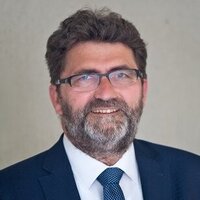
Michael Windfuhr
Deputy Director
German Institute for Human Rights
Bio
Michael Windfuhr is a political scientist, educated at the University of Heidelberg. Since 2011, he is the Deputy Director of the German Institute for Human Rights, the national human rights institution of Germany. Since autumn 2014 he is member of the Independent Complaint Mechanism of the there European Development Finance Institutions DEG, FMO and Proparco (from Germany, Netherlands and France). Beginning of 2017 he started to be a member of the UN-Committee on Economic, Social and Cultural Rights. In 2020 he was reelected up to 2024 and is currently vice-chair of this Committee.
For the five years prior to this, he served as Human Rights Director of Bread for the World, the development organisation of the Protestant church of Germany. Between 1988 and 2006 he co-developped FIAN-International (FoodFirst Information and Action Network), an international human rights organisation that focuses on the realisation of the right to adequate food.
From 1998 to 2010 Michael Windfuhr lectured at the Institute of Political Science at the University of Heidelberg for more than ten years. His main fields of publication and teaching are: human rights policies, international relations theory, international economic and development policies. He has published extensively, particularly on economic, social and cultural rights as well as on trade and agricultural policies.

